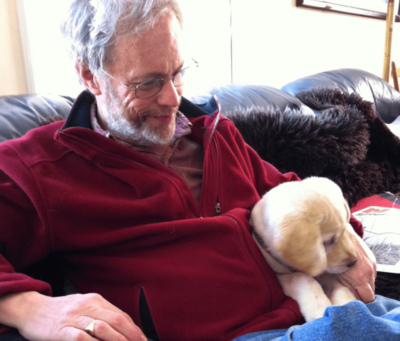Philip Fass: Capturing history for future generations
As a teenager, Philip Fass liked to make short films, enjoying both the technical and creative parts of the process. Fearing he would be unable to earn a living behind the camera, he went to work as a business writer, but in 2004, the long-time Charlotte resident returned to his roots by opening Legacy Video Portraits. The business specializes in biographical videos, family histories, and community profiles.
“I enjoy getting to know the people I work with,” Fass said. “I’m trying to make video portraits that are lasting and will please the subjects and all the people who get to see the work. I’ve been pretty successful in giving people something they’re happy to have.” Fass noted that video provides more detail than can be obtained through written words or even audio. “You may catch a facial expression,” he said “or even a pause when someone takes time to think before answering.”

Fass believes he has a knack for inspiring trust. “I somehow seem to have the gift for enabling the people I work with to trust me,” he said, giving the example of a video he created called “Seven Portraits of Highgate.” “I remember one man,” Fass said. “When I’d arranged to interview him by phone he seemed reluctant. He was tall and he opened the door slowly and looked down at me before he let me in.” Fass generally needs twenty minutes to set up his equipment and has found that this helps people adjust to his presence as they chat off camera. “Even though we’d approached each other warily at the beginning,” Fass said “by the time we were done, he didn’t want me to leave.”
Sometimes, larger projects like Fass’s unfinished “History of Burlington,” lead to other endeavors. While working on that video which has been delayed by the pandemic, Fass met former Burlington mayor, Frank Cain. “He was so charming and sharp and had such wonderful stories that I thought he and his wife Mary Jane would make for an excellent biographical video,” Fass said. The couple agreed and Fass collected archival material to accompany the interview, eventually creating a DVD for the Cains’ children, grandchildren, and great-grandchildren. “I’m sure those will stay in the family for many years,” Fass said, noting that an unanticipated result of the time spent with Cain was that the two developed a lasting friendship.
For Fass, the key is to do his interviews respectfully and with a strong interest in the stories people tell. Another important facet of his work is allowing the interview to move in unexpected directions. “I have questions written down based on pre-interview discussions,” he said “but I always let myself veer away from them and follow interesting threads wherever they go.” Fass noted that sometimes when he watches someone else’s interview he realizes the interviewer is simply going from one pre-written question to another without following up on unexpected tangents. “That’s such a waste,” he said. “When someone says something that captures your imagination, you want to take it further.”
The crux of Fass’s work is the telling of personal histories. “Those connect us, form our understanding of who we are, and tell future generations about us,” he said. He pointed to a video he created for the centennial of the Bixby Library in Vergennes. Although the video included a narrated tour inside the building, for Fass the most relevant part was interviews with people who talked about what the library meant to them. “That is so much more important in terms of defining the value of the place than just the physical description or history,” he said. “If you think of the library as a living, breathing part of the community, it’s really people’s experiences that reveal that.”
Fass notes that it’s hard at the beginning of a project to estimate the cost. “I do my best to work within the time frame and the budget people give me,” he said “and I’m open to exploring what is reasonable, but I hope people realize that a family video becomes more significant over time. It’s something you hold onto. It’s mostly for future generations.” Since his goal is to make his subjects happy, Fass gives them the final say in their projects. “It’s very much a collaboration,” he said. “They are sitting down with someone they’ve never met but in the course of an hour I hope they can relax, forget about the camera, and enjoy the conversation.”

